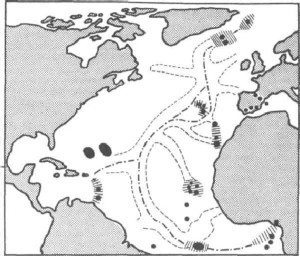Roland Horn
Knörr, Alexander
Alexander Knörr is the author of Hagar Qim [1605] in which he discusses the cart-ruts of Malta, concluding that they must be at least 9,000 years old. But he goes further, declaring that the famous temples of Malta are more than 12,000 years old!
that they must be at least 9,000 years old. But he goes further, declaring that the famous temples of Malta are more than 12,000 years old!
>Knörr has published, in German, a wide selection of both fiction and non-fiction books(b).< Inevitably, he tackles Atlantis, attributing its demise to the breaching of a dam at Gibraltar leaving Atlantis at the bottom of the Mediterranean.>However he offers little evidence to support his wild speculations.<
Nevertheless, Roland M. Horn has offered a favourable review of Knörr’s book(a).
(a) Alexander Knörr: Hagar Qim: Auf den Spuren eines versunkenen Kontinentes – Atlantisforschung.de *
Atlantisforschung.de
Atlantisforschung.de is the name (meaning Atlantis Research) of an important German website(a) launched on October 1st, 2010. Extensive preparation by Roland Horn and Bernhard Beier has produced a very valuable portal with a range of comprehensive articles relating to ancient history, with an emphasis on the Atlantis mystery.
However, the genesis of the site goes back to as early as 2001 when Beier and Horn decided to establish an all-embracing database relating to Atlantis and ancient civilisations generally. The initial version was online from 2002 until 2004 when the compilers decided to close it down, improve the software and expand the content. This took place over the ensuing six years until the current site was activated in 2010, with its well-deserved outstanding success.
In a FAQ session, the following revelation emerged
“Does Atlantisforschung.de have an ‘editorial position’ on the geographic localization of Atlantis?
“Jain”. Basically, we don’t see it as necessary or useful to have a unified editorial position on the localization issue, but of course, we as individuals have our respective opinions. As for these, the current team members agree that “Atlantis” should be viewed as a prehistoric pan-Atlantic cultural complex which – at least temporarily or in phases – radiated out to both the Afro-European West and the American continents and affected cultural diffusion.
With regard to the exact geographic location of the metropolis of the putative Atlantean kingdom described by Plato, we as ‘Atlanticians’ assume that both locations IN the Atlantic (e.g. in the mid-Atlantic, in the Caribbean or in the area of ??today’s Bahamas) and AM Atlantic (e.g. in Iberia, Northwest Africa, but also Mexico) come into question.”
[My only comment is, that if too many people sit on the fence, it will break]
For those, like myself, who only understand English, just using your browser’s translator will reveal a vast store of information and references.on the Atlantisforschung website.
I had to announce the unexpected passing of Bernhard on January 29th, 2021 His contribution to atlantology was inestimable and he leaves a most valuable legacy for generations to come. His colleague and friend Roland Horn will, at least temporarily, take over the maintenance of the site.
In March, 2021 it was announced that new editors were being sought for Atlantisforschung. Applicants will require a command of German and be sympathetic to the objectives of the website. Those interested should contact Roland – https://atlantisforschung.de/index.php?title=Wir_über_uns
Beier, Bernhard
Bernhard Beier (1960 – 2021) was born in Krefeld am Niederrhein in Germany. Marketing is his profession, but his first love is researching ancient history. Along with Roland Horn, they are the driving force behind the important German website, Atlantisforschung.de(a), launched on October 1st 2010. Beier, who has been studying the Atlantis mystery for thirty years is the editorial director of the new website.
important German website, Atlantisforschung.de(a), launched on October 1st 2010. Beier, who has been studying the Atlantis mystery for thirty years is the editorial director of the new website.
>With great sadness, I have to announce the unexpected passing of Bernhard on January 29th. His contribution to atlantology was inestimable and he leaves a most valuable legacy for generations to come. His colleague and friend Roland Horn will, at least temporarily, take over the maintenance of the site.<
Muck, Otto
Otto Heinrich Muck (1892-1956) was born in Vienna and graduated as an engineer at the Munich College of Advanced Technology. Muck had a very productive life that saw him hold patents for around 2000 inventions at the time of his death. During World War I, he was a flying officer and during World War II, he invented the U-boat schnorkel and was also a member of the Peenemunde Rocket Research Team. After the war Muck was a scientific consultant to large industrial concerns. He died in 1956 following an accident.
>Muck was an ardent catastrophist, a view that was at the heart of his Atlantis theory. Unrelated but interesting was his willingness to endorse the idea that pre-Columbian America has been visited by Phoenicians! Unfortunately, according to Atlantisforschung, his belief was based on the disputed ‘inscriptions’ found at Pedra da Gávea in Brazil. The same site has a number of articles concerning the life and work of Muck(f).<
Muck published his worthwhile contribution to the Atlantis mystery, in German, Alles über Atlantis[1468], in 1954. It was translated into English by Fred Bradley and published in Britain in 1978 [098]+. The book was well received and his views continue to have support today.
Muck’s book is now out of print, but English translations of it can now be viewed and downloaded from the Internet(a).
Muck believed that Atlantis had been located on the Mid-Atlantic Ridge and was destroyed as a consequence of an asteroidal impact. He maintained that the asteroid hit the Atlantic, east of the Caribbean, creating the remarkable Carolina Bays en route with its attendant debris and causing tectonic disturbance of such a magnitude that it led to the sinking of Atlantis. He considered the Azores to be remnants of Atlantis.
Muck attributes many of our flood myths to the ensuing tsunamis. With Teutonic precision, he pinpoints the time and date of this disaster to 8.00 pm on June 5th, 8498 BC, but carelessly omits to tell us whether this is Greenwich Mean Time, Central European Time or some other zone.
Muck’s impact theory would appear to have been ‘inspired’ by the studies of two American geologists, F.A. Melton and W. Schriever in the early 1930s and the later work by W.F. Prouty(a).
However, I must point out that when an aerial survey was carried out in 1931 when the number of ‘bays’ was counted at 3,000. Muck estimated that the bombardment was even greater off the coast, with as many as 7,000 more hits in the ocean. So based on this total of 10,000 Muck proceeded to calculate the mass of the asteroid. Now that we know that the bays on land may number as many as half a million, Muck’s estimations need serious revision.
 Muck identified what he considered to be two huge impact craters in the Atlantic east of Puerto Rico as evidence of the catastrophe that led to the destruction of Atlantis. Unfortunately for Muck supporters, improved satellite imagery since the 1970s has shown these ‘craters’ to be chimeras(c).
Muck identified what he considered to be two huge impact craters in the Atlantic east of Puerto Rico as evidence of the catastrophe that led to the destruction of Atlantis. Unfortunately for Muck supporters, improved satellite imagery since the 1970s has shown these ‘craters’ to be chimeras(c).
He further contended that prior to the destruction of Atlantis in the Atlantic the Gulf Stream had been blocked and that after the catastrophe it had pushed northward improving the climate of the British Isles and northwest Europe. In this regard, he was following the views of René Malaise. A German article(b) by Dr Gerhard Kühn, in 2016, has offered some support for Muck’s suggestion that the Gulf Stream had been deflected by a large island in the Atlantic before the end of the last Ice Age. While in the same year, another report(d) proposed that the Gulf Stream had not been interrupted during the last Ice Age!
Understandably, half a century later, advances in various scientific disciplines have demonstrated flaws in his theories. Nevertheless, a number of researchers, such as Wolter Smit, Dale Drinnon, Roland Horn and Prescott Rawlings still support aspects of Muck’s theories. More recently, Andrew Collins adopted Muck’s Atlantic impact theory in his Atlantis in the Caribbean[1197].
However, Muck’s book is still worth reading as a study in theory building. Used copies can (Feb. 2013) be had very cheaply (€0.01) through Amazon.
Over twenty years after his death, another book commenced by Muck was published as Geburt der Kontinente (Birth of the continents)[1100]+, completed by F. Wackers and edited by Mario Muck and Ferdinand Wackers.
[1100]+ Geburt der Kontinente : e Protokoll zum 8. Scho?pfungstag : Muck, Otto Heinrich : Free Download, Borrow, and Streaming : Internet Archive (to borrow) (German)
(a) https://www.scribd.com/doc/16206238/The-Secret-of-Atlantis-by-Otto-Muck
(b) https://www.eike-klima-energie.eu/2016/06/24/teil-1-was-geschah-vor-10-000-jahren/
(c) https://grahamhancock.com/phorum/read.php?3,700894,701308#msg-701308
(d) https://www.sciencedaily.com/releases/2016/02/160219134816.htm
(e) https://www.scientificpsychic.com/etc/carolina-bays/carolina-bays-prouty.html
(f) Otto Muck on Phoenicians in America – Atlantisforschung.de (atlantisforschung-de.translate.goog) *

